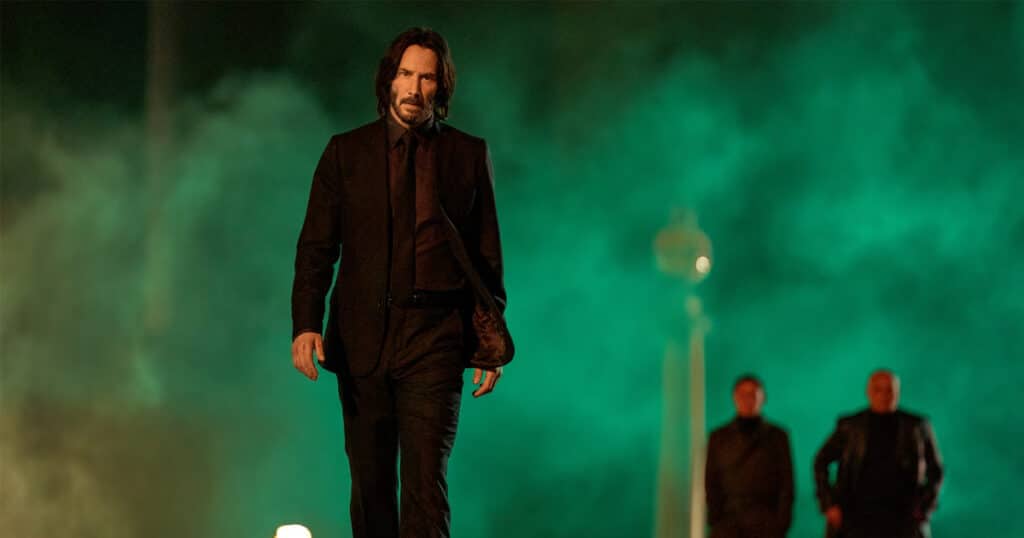
A Mythology for Young Men
The following is a condensed version of “A Mythology for Young Men” by Titus Techera, published at Law & Liberty.
John Wick started back in 2014 with a moment of grief that recalls Mel Gibson in Lethal Weapon (1986). John’s wife dies of cancer, leaving him to feel empty, unable to save her, unable to love anymore. The images of beauty in his life–a puppy the wife had left him, his modernist house, his old Mustang—turn out only to attract criminals looking to rob him and the image of the luxurious American life for the middle aged man thus becomes an added humiliation. This is what turns John into a figure of vengeance, a man to right the wrongs of our world. His misery makes us think of Hamlet’s complaint:
For who would bear the whips and scorns of time,
The oppressor’s wrong, the proud man’s contumely,
The pangs of despised love, the law’s delay,
The insolence of office and the spurns
That patient merit of the unworthy takes,
When he himself might his quietus make
With a bare bodkin?
Of course, suicide is un-American, and John instead turns to punishing the criminals, who turn out to be Russian mobsters—a reliable image of the cruel, despotic attack on American freedom in any number of action movies in our time. But John Wick is not a revenge movie and it’s not even a story of manly self-assertion. It’s instead about turning to mythology to deal with the confusions and dangers of our modern lives, which may not make sense and therefore might send especially the young men who make up the movie’s core audience to storytelling.
This is why we come to the flamboyantly choreographed violence of the series. John’s unjust suffering reveals that he is more than able to defend himself. He is scarier than the criminals, an infamous assassin in a secret world of assassins, with its complicated hierarchies and organizations, and a feeling of doom, of the inescapable claims the past makes on a man, whatever his prowess or daring. John’s double identity makes him a very attractive character precisely because it seems to put him beyond justice, living by the gun. But it also reveals that the concern with justice, preferring victims to perpetrators, the innocent to the criminal, is somehow connected with the anger of the young, which they cannot control and which we as a society fail to help them control. Instead, they turn to the movies for an adequate teaching.
John returns to that world of crime that seems to bind together the richest and poorest, the business elites of the modern corporate economy who keep us at a distance and the underclass we stay away from. John stands for his audience, we middle-class people, and, following him, we learn about the origins of the desire for equal freedom in the democratic war on the old aristocracies which provide us our myths. Scene after scene, across four movies, the John Wick series takes viewers on a tour of world history as well as cinematic history, trying to bring out a universal ideal of honorable behavior in face of terrible injustice coming out of the presumption of the aristocrats, at the same time as it teaches the audience that yearning for comfort is both undignified and unreasonable—there is always some danger and it needs men to face it. Our fascination with splendor and glamour, the honorable and the cruel, makes the stories Romantic, yet dangerous. We are supposed to return to our own more egalitarian pieties once these ghosts are put behind.
Accordingly, the movie takes us on a tour of the old, pre-democratic, pre-American world, its customs and costumes hinting of super-human beauty, of tragedy. John has to battle a Marquis in Paris, outside Sacre Coeur, who represents the highest authority in the world of assassins, after he assassinates the previous leader of that organization, called the High Table. John is chased by an old friend who has become corrupt, a blind Chinese swordsman played by Donnie Yen, the most famous martial arts actor in Hong Kong. John also has loyal friends, for example a Japanese man, with the honor of a samurai and the criminal way of life of the yakuza, which makes for another elaborate action set piece in Osaka.
In short, it’s everything available in entertainment for boys over the last two or three generations, from James Bond to the computer games that have players practice their dexterity to provoke images of bloodshed. The past is conjured up because the present is boring, confused, lacking in spiritedness, yet the best conjuring that our entertainment can do will leave the young as naïve as when they started looking for fantasies of violence, but less aware of the dissatisfaction that sends them searching for heroes.
Titus Techera is the Executive Director of the American Cinema Foundation and hosts the ACF podcasts. He is a contributor to Modern Age, National Review Online, and University Bookman. He tweets as @titusfilm.
This article was originally published by Law & Liberty Exclusive and made available via RealClearWire.



